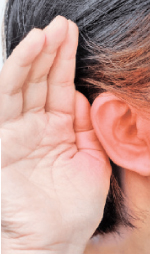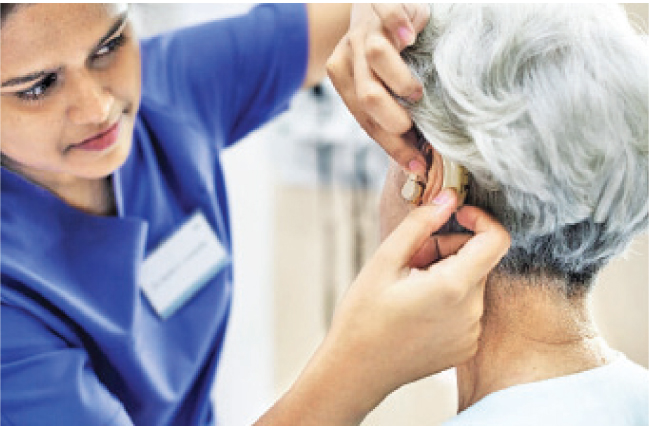 Today Consultant ENT Surgeon Dr. Ms. Chandra Jayasuriya, the Head of the ENT Unit of the Colombo National Hospital speaks about deafness. Here she talks about checking our hearing at home / office before consulting a doctor or visiting a hospital and other related facts.
Today Consultant ENT Surgeon Dr. Ms. Chandra Jayasuriya, the Head of the ENT Unit of the Colombo National Hospital speaks about deafness. Here she talks about checking our hearing at home / office before consulting a doctor or visiting a hospital and other related facts.
Q. How deafness can occur?
A. Deafness occurs due to the result of sound signals not reaching the brain. There are two main types of deafness. They are
(1) Sensorineural deafness, where the problem is in the inner ear and nerve related. This is caused by damage to the sensitive hair cells inside the inner earor damage to the auditory nerve.
(2) Conductive deafness, when the hearing loss is due to problems in with ear canal , drum or middle ear.
Cause for sensorinueral deafness are,
(1) Age related :- Occurs with age, most start loosing their hearing from around 40 years of age.
(2) Exposure to loud noises :- Due to repeated exposure to loud noises over time. This is known as noise induced hearing loss. This occurs when the sensitive hair cells inside cochlea get damaged. There is a high risk of developing noise induced hearing loss if you work with, noisy equipment’s, work in environments where there is loud music, regularly listen to music with high volume through headphones.
 The other causes are genes (born deaf or become deaf with time), Infections of inner ear (mumps , measles), acoustic neuroma ( tumors of the nerve of hearing meningitis/ encephalitis.
The other causes are genes (born deaf or become deaf with time), Infections of inner ear (mumps , measles), acoustic neuroma ( tumors of the nerve of hearing meningitis/ encephalitis.
The causes of conductive deafness :
Sometimes children are born without the ear canal.
1. Blockage of external auditory canal by ear wax.
2. Build-up of fluid in the middle ear due to phlegm reduces the vibration of ossicles in the middle ear. This is common in children.
3. Foreign body in the ear canal can block the sound waves reaching the ear drum. Children & mental retarded adults insert foreign bodies in the ear.
4. Perforated ear drum due to infection or trauma
When the ear drum is perforated, sound conduction to the inner ear is poor. So there is Conductive deafness.
5. Otosclerosis – abnormal growth of bones in inner ear, so they get less mobile and less effective in transmitting sound.
Q. How we should take care of our ears ?
A. Ear is a tunnel, the coverings of this tunnel is made out of few layers. Out of those the most basal layer replicate and produce new cells while the most superficial layer gets mature and they shed off. These cells mixed out with wax & come to the orifice of the ear canal. A shower can wash off these cells. There are glands in the ear canal which produce wax and this wax has a protective effect in external ear canal. The dead, desquamated cells migrate and they mix up with wax.
Without active cleaning the ear canal can automatically cleaned up due to this migration so therefore no need to put cotton buds and hair pins to remove the wax.
If you are bathing in a river, there is a risk of contaminating the ear with water. If your doctor recommended you to have dry ear precautions it’s better to wear an ear plug to avoid the contamination. Otherwise this can lead to fungal infections of the ear canal.
If you are having diabetes mellitus, be careful when you bath and better to wear earplugs. If accidently you put water in your ear, then hold a hair drier near the ear until the water gets dry.
Q. What if a person suddenly lose his/her hearing
A. If you suddenly find deafness in one year you should see an ENT Surgeon immediately. Conductive loss is mostly reversible and can be treated.
There are two main categories of possible causes for the sudden loss of hearing.
1.Conductive causes (outer and middle ear-related)
* Ear wax
* Outer ear infections leading to swelling
* Damaged eardrum and middle ear swelling during an accident
2. Neurological causes (inner ear, cochlear nerve and brain related)
- Infections of the cochlea caused by the spreading of a middle ear infection
- Hair cells damage within the cochlea due to viral infections. eg: Mumps, measles (many have experienced unilateral deafness secondary to mumps)
- Hair cells damage due to certain medicines. eg: Cancer drugs, antibiotics, streptomycin
- Acoustic neuroma (tumours of the acoustic/cochlear nerve)
- Brain related causes (multiple sclerosis)
- Hair cells damage as a result of reduced inner ear blood supply (diseases like diabetes, high cholesterol and high blood pressure affect the calibre of small vessels in the inner ear)
- For no obvious reason
If a nerve loss is indicated, the patient will be admitted to the ENT unit for further investigation. If we find one has unilateral deafness of nerve origin occur suddenly, we give an injection into the middle ear under magnificent.
Three doses are given in 4 days interval. Reversal of sudden deafness occur with these injections, provided the patients meet the ENT Surgeon within 24 to 48 hours.
Q. Why some people are complaining about hearing various sounds/noises inside their ears ?
A. Hearing a sound without the presence of actual environmental stimuli called tinnitus. This situation can frighten the patient. Tinnitus may be the presenting symptom in any hearing impairment. When the hearing of environmental sounds is impaired, the impulses generated in the inner ear and the auditory nerve may be heard as a noise (tinnitus). Sounds generated by the flowing of blood in the vessels and neck as well as jaw movements may also be heard as tinnitus. There are two main causes for tinnitus.
1. Ear-related causes
2.Generalised causes
The ear specific causes are :- Senile deafness, hearing impairment due to natural ageing, Hearing loss due to exposure to loud sounds. eg. workers who work in factories where they are exposed to loud sounds, Menier’s disease, inner ear disease, Acoustic neuroma , a tumour of the auditory nerve, Otosclerosis, stiffening of the middle ear bones (ossicles), Tumours of the middle ear, Impacted wax in external auditory canal.
The Generalised causes:- High blood pressure, Anaemia, leukaemia (diseases of the blood), Diabetes & High Cholesterol (due to these diseases the tiny blood vessels may get blocked causing inner ear and auditory nerve problems), Hyperthyroidism, Fever, Young patient with high fever may experience tinnitus.
These are questions the ENT surgeon will ask you about tinnitus.
(1) Whether there is a connection between the tinnitus and the pulse beat. (The loud sound heard along with pulse beat is related to blood circulation).
(2) Duration of the sound. (Prevailing the whole day or occurring from time to time?)
(2) Whether it is interrupting a person’s daily routine ?
(3) His/her medical history regarding other diseases or medicines.
The ENT surgeon will examine for ear specific causes. If the medical history and examination indicates a generalised cause, patient will be referred to a consultant physician.
The following tests are usually carried out :- Blood tests, fasting blood sugar, cholesterol, Full Blood Count and blood picture to exclude anemia and other blood diseases, ESR, Thyroid hormone level, Audiogram (hearing test)
Every patient with tinnitus will be subjected to a hearing assessment test as hearing loss can lead to this condition, CT or MRI scan to detect brain tumours and other brain disorders.
Treatment :- If bilateral hearing loss is detected, a hearing aid is prescribed.
If the condition is causing the patient to lose sleep, he/she is asked to keep a radio switched on at the bedside. This will help the patient sleep by masking the tinnitus. Psychiatric treatment and counseling. Tinnitus can lead to depression and attempted suicide.
Q. How we can easily test our hearing at home, at school or at office before going to a hospital or consult an ENT surgeon ?
A. Stand behind the patient’s (the person who is undergoing the test) field of vision. This eliminates the possibility of lip-reading. Press one ear (Tragus) with finger. Another person who stands in hands length (two feet away) should tell few two digit numbers in whispered voice. The patient should be able to hear and repeat the numbers. If he/she can the hearing is good and if he/she cannot the hearing is poor. When this test is performing on a child, short questions can be asked instead of two digit numbers.







